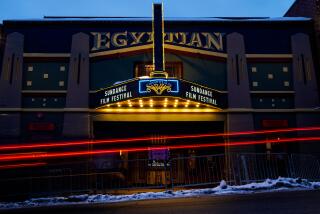Navigating the Names
Founded in 1978, relocated to Park City, Utah, in 1981, taken over by the Sundance Institute in 1985 and given its current name in 1991, the peripatetic Sundance Film Festival has not always been the confident behemoth you see before you.
But as this, the most important American film celebration, looks toward its official Thursday night Salt Lake City opening (the film is Christine Lahti’s “My First Mister,” starring Albert Brooks and Leelee Sobieski as unlikely soul mates), one thing about it has remained constant: Everybody wants to get in, either as ticket-holders or, more to the point, as filmmakers.
This year, for the umpteenth time in a row, while the number of documentary and dramatic competition slots have held firm at 16 each, the number of entrants has gone up. In the mix were 854 dramatic films and 390 docs, not to mention the 515 international pictures wanting to be in World Cinema and the 2,174 shorts competing for 63 positions. As recently as 1995, the number of features submitted was only 250, and the number of shorts has close to doubled since 1997.
Even Slamdance, Sundance’s most venerable alternative, which this year moves off Park City’s crowded Main Street to the Silvermine on the city’s outskirts, received a record 2,326 submissions. As a further indication of festival maturity, Slamdance has joined with fellow alternative festivals Digidance, Lapdance, Nodance, Slamdunk and TromaDance to form the Wasatch Festival Syndicate with the apparent aim, among others, of throwing a memorable closing night party.
Given that 94 of Sundance’s 106 feature films will either be world, North American or U.S. premieres, one of the constants of the festival, along with the crowds and the snow, is that a lot of its selections will be surprises to a lot of people. Still, there are several rules of thumb about the various categories that look to be as true this year as they were in the past.
Rule 1: The Premieres section will have the most familiar names among directors and actors. Interest centers on Michael Apted’s Tom Stoppard-written “Enigma” and its focus on code-breaking in World War II, Patrice Chereau’s erotic-sounding “Intimacy,” Richard Linklater’s animated “Waking Life,” Allison Anders’ “Things Behind the Sun,” the Courtney Love- and Lili Taylor-starring “Julie Johnson,” and “Double Whammy,” an offbeat detective story directed by “Living in Oblivion’s” Tom DiCillo and starring Denis Leary, Elizabeth Hurley and Steve Buscemi.
Sure to draw attention in this section is Ben Kingsley’s performance in “Sexy Beast,” a stylish British thriller directed by Jonathan Glazer. As psychotic gangster Don Logan, a flesh-and-blood Terminator who is all menace, all the time, Kingsley is terrifying enough to forever banish all thoughts of “Gandhi” from your mind.
Rule 2: The dramatic competition is a big question mark, with few guides as to what may or may not prove to be of interest. This year, a few films come with a bit of help: “Hedwig and the Angry Inch” is an adaptation of the popular musical, and “Green Dragon” is directed by Timothy Linh Bui, whose brother and co-screenwriter Tony was responsible for the 1999 Sundance-winning “Three Seasons.”
Three other competition films are by directors with independent reputations. “The Deep End,” taken from the same pulpy material that was the basis of Max Ophuls’ 1949 “The Reckless Moment,” is by the “Suture” team of Scott McGehee and David Siegel. “Sleepy Time Gal,” a drama starring Jacqueline Bisset, is the first color film from “The Hours and Times’ ” Christopher Munch. And Christopher Nolan follows up the well-received “Following” with “Memento,” a nervy, mesmerizing thriller which was previously applauded at Toronto.
Rule 3: Pound for pound, the documentary competition offers the surest bet for a satisfying experience. There are presumably boring and inept docs out there, but they never wander into this festival. Among the most interesting this year, in alphabetical order, are:
* “The Endurance.” Sir Ernest Shackleton’s star-crossed Antarctic expedition of 1914-16 has had numerous treatments (another one with Kenneth Branagh has just been announced), but it’s such a great story that when it’s well-told, as it is here, another version is always welcome. Directed by George Butler, this gripping effort features interviews with the crew’s descendants and luminous new color footage of the area.
* “Go Tigers!” An engrossing film from doc veteran Kenneth Carlson that shows just how much Massillon, Ohio’s high school football team, next door to a religion to its thousands of fans, means to the town it calls home. An involving tapestry that serves as a microcosm for a sports-crazed society.
* “Scratch.” A cheerful, comprehensive look, as involving for the uninitiated as it is for disciples, at the origin and influence of the scratching sound that is the omnipresent staple of hip-hop music. Directed by Doug Pray (“Hype”), “Scratch” interviews top DJs like MixMasterMike and Q-bert and features dazzling displays of turntable manipulation.
* “Startup.com.” A classic fly-on-the-wall documentary (by many members of the team that made “The War Room”) that looks at what happens when two friends launch an Internet site called govWorks.com that mushrooms from eight employees and no money to 220 employees and a $50-million valuation. As vivid an examination of what went down during the e-business bubble as we’re likely to get.
* “Trembling Before God.” A powerful, troubling film about the nightmarish situation gay and lesbian Orthodox Jews face when, refusing to abandon either their sexuality or their religion, they try to reconcile their essential natures with a community that holds them in contempt. Wrenching stories of struggle and denial were collected over a five-year period by director Sandi Simcha DuBowski.
Something special, even in this company, is another documentary competition entry, “LaLee’s Kin: The Legacy of Cotton,” co-directed by Susan Froemke and Deborah Dickson with the legendary master Albert Maysles, who was also the cinematographer. Focusing on one family and one school district in the Mississippi Delta, “LaLee’s Kin” details how poverty and illiteracy remain persistently intertwined as well as the efforts being made to break that cycle. Graced by Maysles’ unforced camera work and an evocative guitar score, this unself-consciously artistic film captures reality in a subtle, poetic way, creating a world that is moving without resorting to manipulation.
Rule 4: The American Spectrum, usually a home for films that didn’t quite make it into competition, will have more than its share of pleasant surprises.
One of the most pleasant this year is the Kornbluth-heavy “Haiku Tunnel,” a sly comedy co-written and directed by brothers Jacob and Josh Kornbluth and starring Josh as an office temp whose inability to mail 17 very important letters leads to all manner of amusing crises. Kornbluth the actor has an astute comic presence and a delivery that does wonders with lines like his tribute to the Uniball: “The Camille of pens, they expire gracefully.”
Rule 5: World Cinema will show a spate of excellent films that won’t get seen or talked about enough. One example is the engaging “Together,” the new film by Swedish director Lukas Moodysson, last represented by the well-regarded “Show Me Love.” A filmmaker with a gift for the human comedy and the foibles of relationships, Moodysson tellingly concentrates on what happens to a Stockholm commune, circa 1975, when the sister of one of the members leaves her alcoholic husband and moves in.
The other rule about Sundance is that it’s become such a big deal that everyone wants to be associated with it. Motorola, for instance, will rent and sponsor a house as “a refuge” for celebrities (one presumes they’ll be grateful). And the USC School of Cinema-Television has so many alumni, students and faculty (more than 20) associated with Sundance or Slamdance projects that they promise to have an official presence as well.
Though not a graduate of USC, John Hansen was perhaps the most proactive of filmmakers. His short, “Faust/The Lost Feminine,” may have only been selected for a noncompetitive Slamdance adjunct called the Filmmakers Lounge, but that didn’t stop him from mailing copies, complete with a blurb from Pauline Kael (“I enjoyed it”) from his home in Sioux Falls, S.D., to a variety of journalists. From all appearances, he even put the stamps on himself.
In such an atmosphere, publicists must work overtime to come up with unique events. Neck and neck for the most inventive so far are “Trembling Before God’s” sponsorship of a havdalah service, the traditional end of the Sabbath, to be officiated by Steve Greenberg, billed as the first openly gay Orthodox rabbi, and TromaDance’s sponsorship of what’s billed as “the world’s first film festival to provide an on-site body piercing booth.” It takes all kinds at Sundance, it really does.
More to Read
Only good movies
Get the Indie Focus newsletter, Mark Olsen's weekly guide to the world of cinema.
You may occasionally receive promotional content from the Los Angeles Times.











